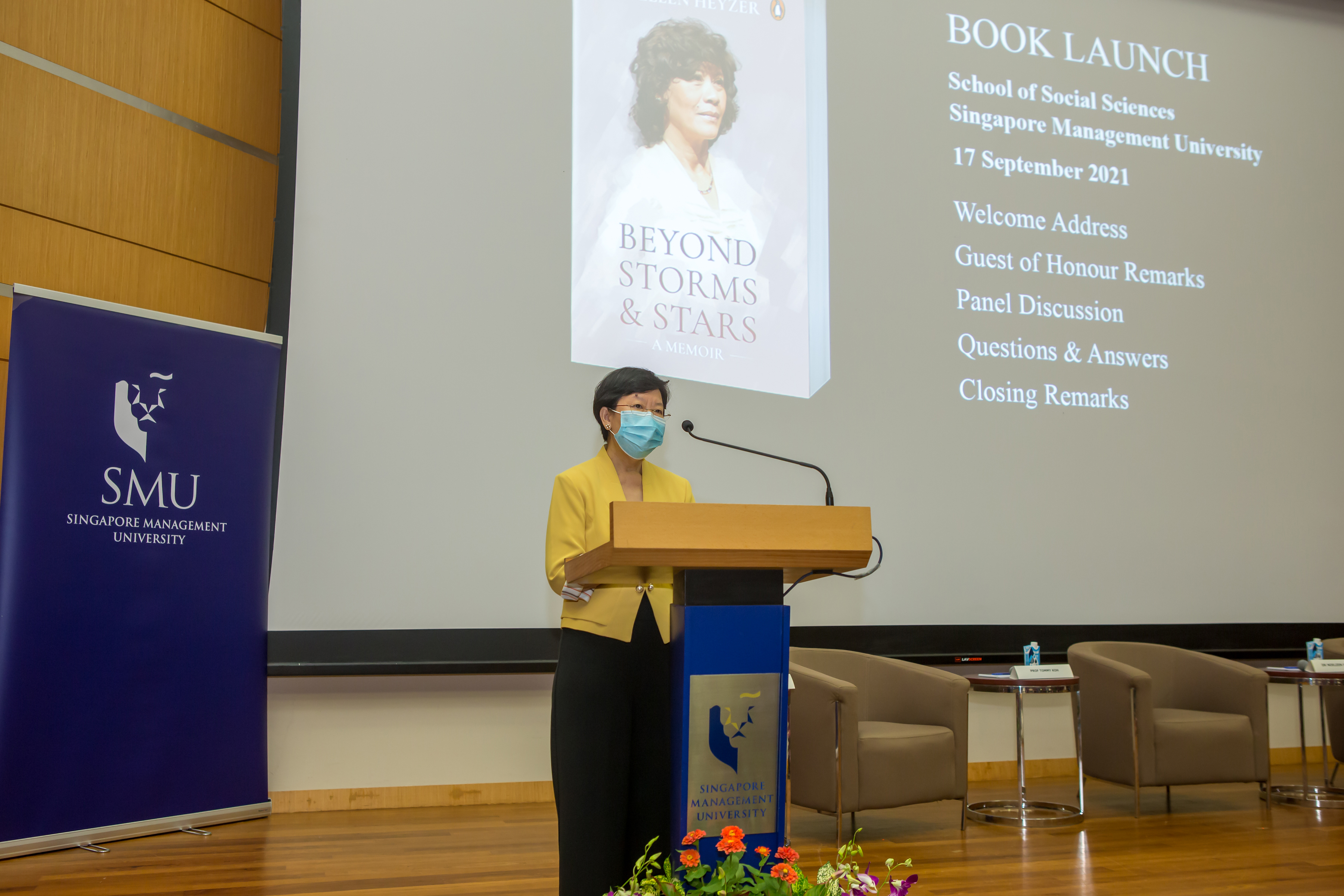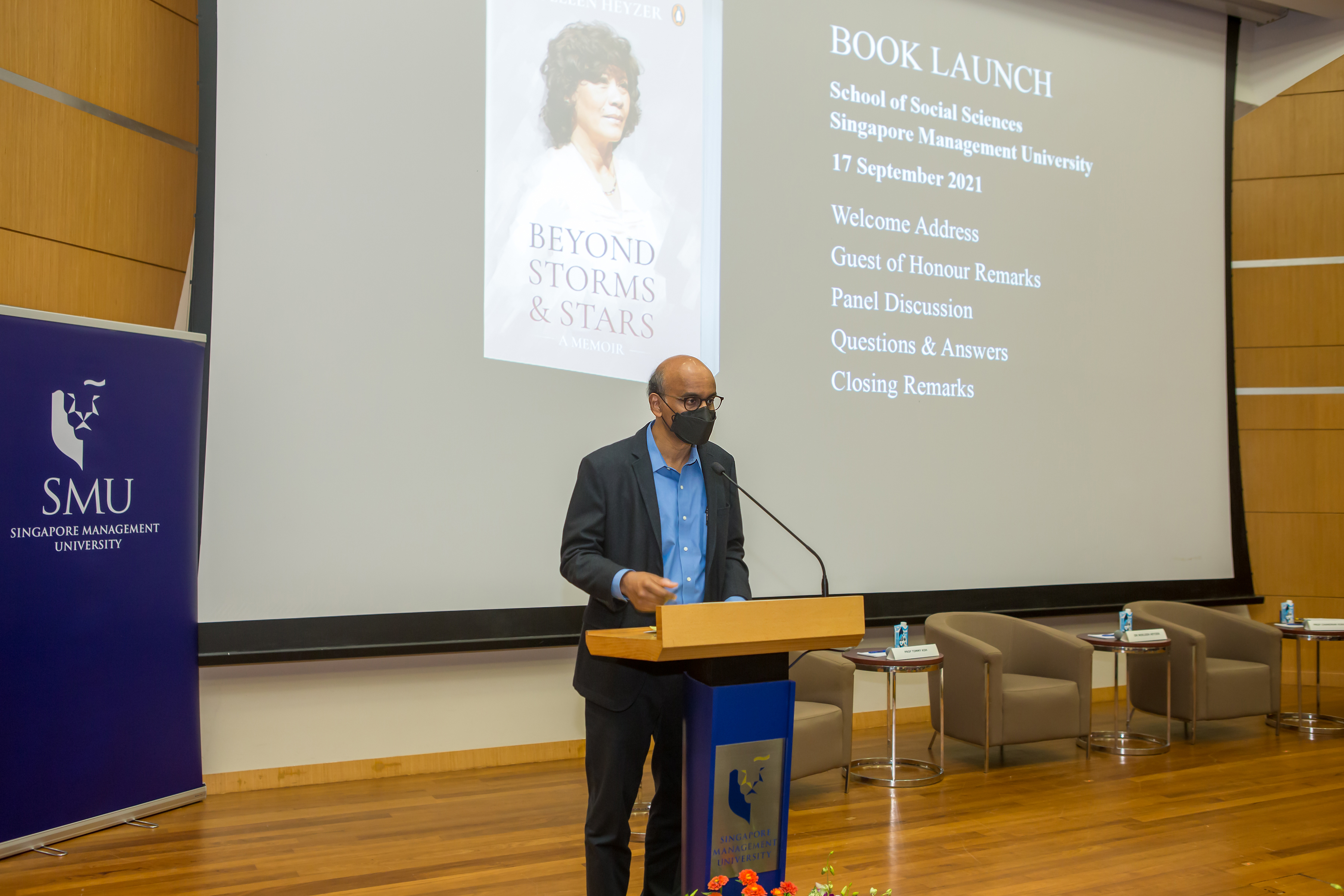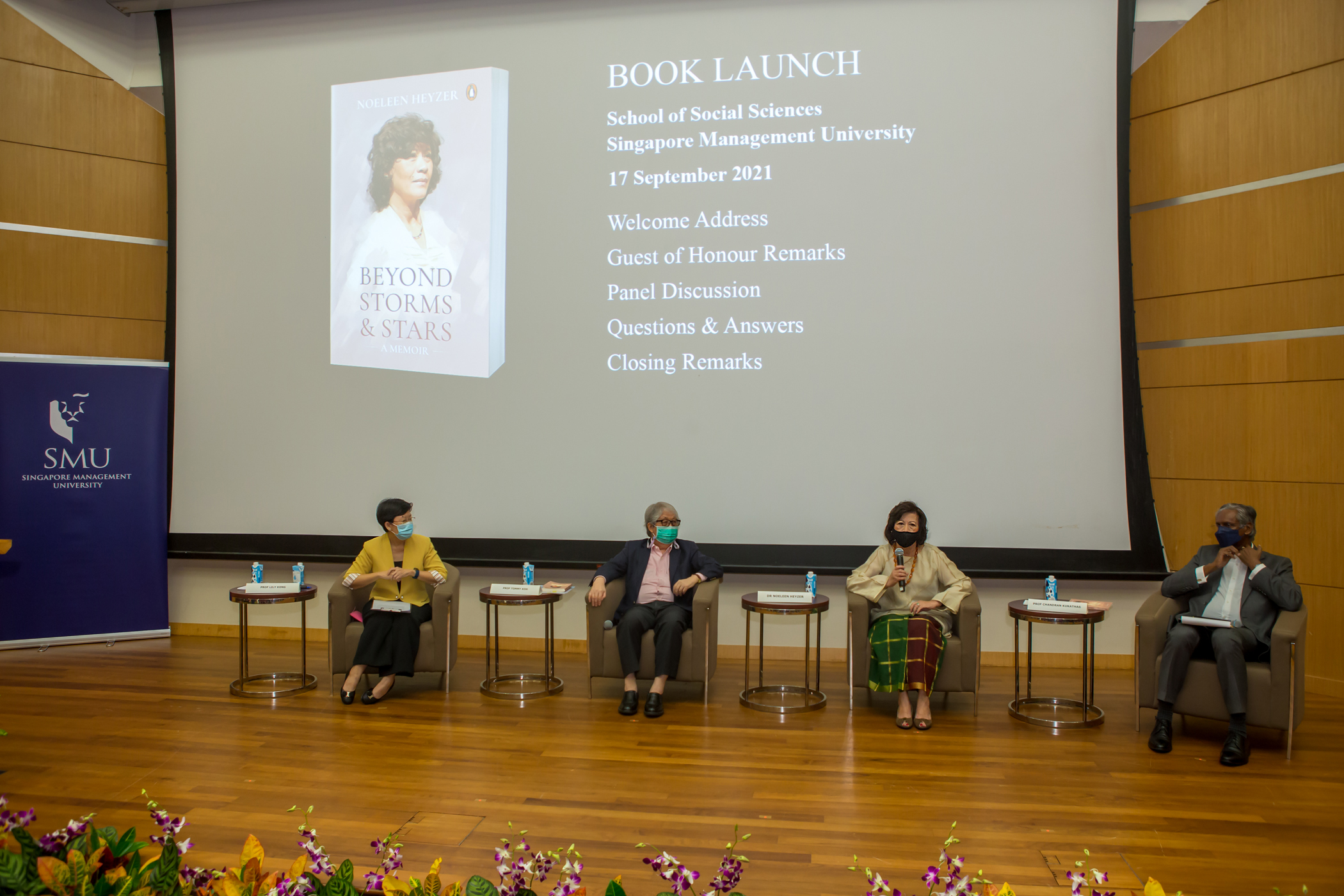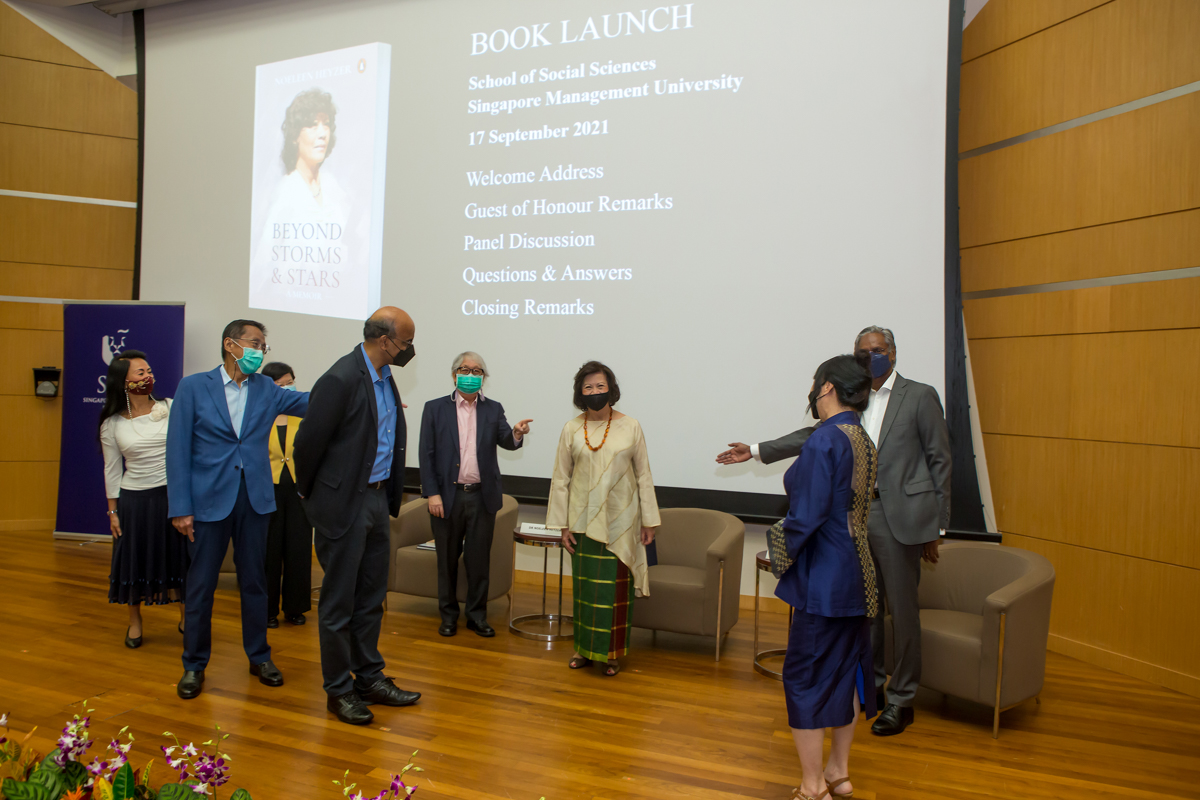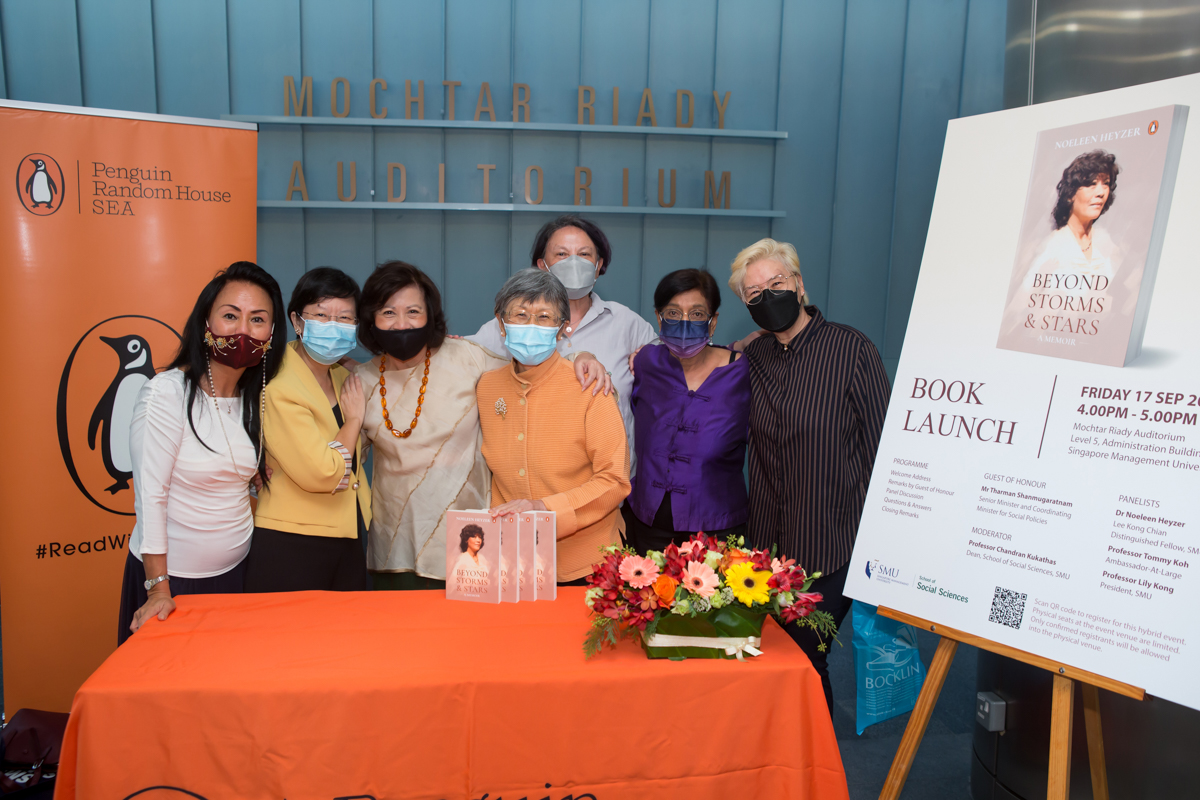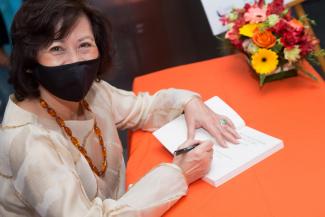
On 17 September 2021, the Singapore Management University (SMU) hosted the book launch of Beyond Storms & Stars – A Memoir by Dr Noeleen Heyzer, social scientist, former Under-Secretary-General of the United Nations (UN) and Lee Kong Chian Distinguished Fellow at SMU.
Dr Noeleen Heyzer was the highest-ranking Singaporean in the UN system during her term and is currently a member of the UN Secretary-General’s High Level Advisory Board on Mediation, which supports specific mediation efforts around the world.
Her memoir Beyond Storms and Stars, describes how she rose from underprivileged circumstances in post-war Singapore to become a trailblazer of women’s global leadership at the United Nations. It is a book that celebrates the resilience of the human spirit and the courage of individuals, communities, and societies to transform structures of discrimination and injustice.
The hybrid event, held at the SMU’s Mochtar Riady Auditorium, was graced by Mr Tharman Shanmugaratnam, Senior Minister and Coordinating Minister for Social Policies. Invited guests comprised SMU’s leadership, senior civil servants and several others who are leaders in their respective fields of academia, medical services, non-government organisations.
In her welcome remarks, SMU President, Professor Lily Kong said she was especially glad that we could have this small in-person event, given the COVID conditions. She shared that she had the pleasure of lunching with Dr Heyzer some years ago where she had conversations about Dr Heyzer’s life and work. “It was a totally absorbing conversation for me. It became apparent to me that our students would have much to learn from her stories, but that these stories were too precious and valuable not to be shared with others too. And so, the idea turned upon her writing a memoir for a far larger audience.”
Prof Kong added that she had thoroughly enjoyed reading the book and was especially inspired by the courage and tenacity Dr Heyzer had displayed, her positive attitude and mindset, and her determination to make a positive difference. Dr Heyzer did not have the opportunity to go to school until she was eight, but she studied hard, and her perseverance led her to attain three degrees eventually, the last a doctorate in social science from Cambridge University. She joined the Institute of Development Studies at the University of Sussex in England in 1979. Later in 1982, she took on her first United Nations job, at the Economic and Social Commission for Asia and the Pacific, or ESCAP, in Bangkok. The rest is history, as she moved from one role to another, serving countries and regions as the Under-Secretary- General of the United Nations.
She ended her address by congratulating Dr Heyzer on writing such an inspiring and insightful memoir and said that SMU is proud and honoured to have her association at SMU.
In his address, SM Tharman said that Dr Heyzer was “one of the most remarkable and inspiring Singaporeans of her generation and a beacon for women all over the world”.
SM Tharman shared a few lessons that he took from reading Dr Heyzer’s book - first of which was how Dr Heyzer’s extraordinarily difficult childhood was the crucible within which her moral imagination was shaped. She was both outraged at how people were made vulnerable by forces that were at times beyond their control, but also saw others who refused to be locked into their social conditions. She was determined to transform her life, urged by her belief in the power of people to define their own destinies. Her life, he said, was a powerful lesson of how adversity can be overcome.
Second, SM Tharman said that Dr Heyzer showed how we can take advantage of the experience of being Singaporean and growing up in Singapore to do good for the world. Dr Heyzer had, after a rocky start in education, written that she had benefited from a good education, and how the pathways to nationhood shaped by Singapore’s leaders provided the ladders of social mobility for many, including her family. SM Tharman felt that being part of the Singapore experience gives us advantage, and also the ability, to contribute to the world. In doing so, we also shape how the world views Singapore as a force for good.
SM Tharman said that Dr Heyzer had also demonstrated how leadership is the ability to persuade, and to translate moral conviction into practical change. Dr Heyzer’s experience in the UN in various capacities were always in a complex setting – there were turf wars, geopolitical tensions and always a shortage of resources. These were very difficult environments in which to operate and effect change. But throughout her career, she has proven her ability to navigate such circumstances, make reforms, and find a way to move forward. She also showed the importance of engaging leadership at multiple levels, including within communities, and of linking realities on the ground to high levels of decision-making.
Fourth, Dr Heyzer exemplified how idealism must never fade from our lives, and how the task of translating ideals into a better reality never ends. SM Tharman highlighted how Dr Heyzer had moved from one challenge to another, with her work always infused with fresh, and even more forceful, idealism. She was in more recent times concerned with new threats to human and global security, including ethnonationalism, hate speech, divisive politics and the narrow self-interests that threatened to weaken multilateral norms and institutions. She remained deeply of the belief that women must be at the centre of a new global social contract, leading change, building effective coalitions, pressuring institutions and creating a vision of a world free of violence and fear for everyone.”
In closing, SM Tharman said that, “We must learn from her life and everyone have that same moral conviction, and the ability to translate moral conviction into practical reality, step by step.”
Panel Discussion
In a panel discussion moderated by Professor Chandra Kukathas, Dean of SMU's School of Social Sciences, Dr Heyzer, Ambassador-at-Large Prof Tommy Koh and Prof Lily Kong discussed how Dr Heyzer had used the values and the platform of the UN to advance gender equality worldwide and contribute to a more inclusive and sustainable Asia Pacific.
Since the event took place at SMU, Prof Koh shared five lessons that SMU students could learn from the life and career of Dr Heyzer. They were:
- No matter how adverse your circumstances and no matter how bleak the future may appear to be, don’t give up. Be strong and endure the hardship. Things will get better. Things got better for Dr Heyzer, when her maternal grandmother came to her rescue and brought her to stay with her.
- When confronted with two options, the hard option and the soft option, resist the temptation to go for the soft option. When Dr Heyzer arrived in New York, to become the new Executive Director of UNIFM, she found that her organisation was in debt. The head of UNDP made her an offer. In return for US$10 million a year, agree to let UNIFM become part of UNDP. She rejected the offer because she wanted UNIFM to be an autonomous organisation. At the end of her tenure the annual budget of UNFM was over US$100m.
- The third lesson is not to be a status quo leader. Be a visionary leader. When she arrived at the UN, gender equity or equal rights for women was a niche issue. UNIFM was a small organization with limited influence. By skilful networking, seizing opportunities and eloquent diplomacy, Dr Heyzer was able to make gender equality a mainstream issue.
- The fourth lesson is that you can be a change maker. Since time immemorial, the soldiers of victorious armies think they have the right to rape the women of the defeated enemy. Dr Heyzer had to move mountains to persuade the UN Security Council, to declare that the raping of women in an armed conflict, is a war crime.
- The final lesson is for the female students of SMU. You still live in a male-dominated world and a male-dominated Singapore. You must not allow men or society to brainwash you into believing that you are not as good as men. Step forward. Speak up. Accept leadership when the opportunity knocks on your door. Fight against prejudice and discrimination. Break every glass ceiling which impedes the rise of women to the top. Lily Kong and Noeleen Heyzer are two role models.
Prof Kong on the other hand, had three lessons to share, both equally applicable to SMU students as well as faculty.
The first takes off from the words of Sir Richard Jolly, who was the influential Executive Director of the Institute of Development Studies at the University of Sussex from 1972 to 1981. He had written in the Foreword to Dr Heyzer’s book: “Academics can learn a lot from her struggles to make research count – for instance, by mobilising victims to explain their situations and lead the actions required for change. Her research into deforestation in the Limbang region of Sarawak is especially revealing. The state government had put the blame on shifting cultivation rather than on those involved in logging or cutting the forests to make way for oil palm plantations. Her research not only revealed the truth but also identified a way forward which mobilised political support – by moving to a situation of joint land titles where women as well as men could own land.”
Prof Kong then invited faculty and students to reflect – As academics and students involved in research, how do we make our research count?
The second and third lessons take off from Dr Heyzer’s own words, beautifully penned in her preface. She wrote: “… each of us must forge our own path as a solitary stream in the landscape of our history before we come together as a confluence that opens to a powerful sea.”
Given the geographical metaphors, these words obviously resonated with Prof Kong, who is a geographer. She added that “a lesson we take away from this and all the evidence base that is fleshed out in the book is that we each must figure out our ikigai – our reason for being – and when we then learn to work together with other like-minded people, the impact can be very powerful.”
The third lesson for Prof Kong, and hopefully for all students and perhaps even some faculty, is the power of the pen. “It is my lament that with social media communications, short messaging, presentation software like powerpoint, google slides, canva and so forth, many are losing the ability to write persuasively, evocatively, yet simply. Let us not lose sight of the beauty of language and the power of the word.”
As for Dr Heyzer, she said she was very happy to be in the company of her mentors. She explained the reason for the title of her memoir where the storms referred to the challenges in her life. As for the stars, she said: "It comes from the lines of Edward Young, a 17th century poet - 'Too low they build, who build beneath the stars'. There are times in our lives where if we are to repair the past to create a new, to reimage and remake our future for the next generation, we need to build beyond the stars."
She added: "I realised in my life's journey that you are never alone. Everything that I think I've achieved has been done through individual effort but also through collective support."
Beyond Storms & Stars – A Memoir costs $23 and is available online.
Read more from The Straits Times.
Watch the launch here.
